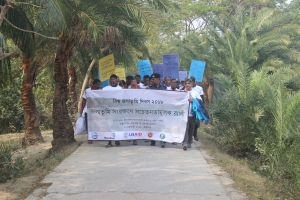Winning drawing by Hajera Begum, Grade 5, Sotoful Govt. Primary School © Samir Saha / IUCN
“Nijhum Dwip is our life; it provides for our families,” wrote one student, referring to the direct dependence of many of the island’s 12,000 residents on the fisheries in the surrounding waters for their livelihoods. The fish collected from the many rivers, inlets, and shallow waters just offshore are sold at the market. This includes the hilsa, a much sought-after delicacy in Bangladesh and other parts of South Asia.
Hilsa fish © Samir Saha / IUCN
In another World Wetlands Day activity, local men – mostly fishermen – entertained the crowd with a display of ‘kabaddi’, a game where two teams take turns sending a team member, or ‘raider’, into the opposing team’s court. The raider must reach the opposing team’s end zone while holding their breath and chanting ‘kabaddi’ the whole time. The opposing team must tag or wrestle the ‘raider’ to the ground before he sets foot in their zone. This lively game enthralled onlookers as they supported their favorite teams.
Following the festivities, local authorities and community members came together to discuss priority issues in Nijhum Dwip: ecosystem conservation, eco-tourism development and gender-inclusive governance. “I would like to thank all the local communities for their support in implementing management activities to reduce pressure on local fish stocks,” said Mr Sheikh Farid, a local Fisheries Officer, in his opening remarks.
“Aquatic resources are very important for local livelihoods,” added Dr Khabirul Haque Belal, President of the local Co-Management Committee, a joint community-government decision-making body. “Only through joint efforts will resources in Nhijum Dwip be used sustainably.”
Local people also expressed the importance of raising awareness in communities and engaging support for sustainable management approaches to protect the wetland. “This conservation is necessary not only to sustain the island but also to ensure our better future,” said a fisherfolk.
“We, the people, are the caretakers of this blessed place,” said Mr Shahad Mahabub Chowdhury, National Coordinator for MFF in Bangladesh, in his closing remarks. “Our grandfathers may not have had to deal with these types of sustainability issues, but we must, if there is to be a future for our children and grandchildren. We must learn from our mistakes in other areas and work together to conserve the beauty and resources of Nijhum Dwip for generations to come.”
IUCN and MFF have been working in partnership with the local government, communities, and other organisations to improve the management of Nijhum Dwip since 2016. As a first step to better understanding the area’s social, environmental, and business dynamics, MFF is undertaking three studies to be completed by the end of 2018: One on gender dynamics, to encourage the inclusion of women in governance mechanisms; the development of an eco-tourism plan to assist the private sector with responsible investment; and an assessment on the biodiversity of the area, to inform management planning.
Also known as the ‘quiet island’, Nijhum Dwip harbours a unique collection of species, including spotted deer and Irrawaddy dolphins, and is a vital breeding habitat for hilsa, the national fish of Bangladesh. During winter, thousands of migratory birds flock to the shores of the island. Based on a literature review and a yearly bird census taken by the Bangladesh Bird Club, more than 300 species of birds in Nijhum Dwip have been identified. The two survey efforts of the current scoping study yielded a total of 139 species of birds comprising about 8,350 individuals, more than 70% of which are reported to be a combination of waders and ducks, resting as they migrate along the East Asia-Australasian Flyway that stretches from Russia to Australia. Several of these species are threatened globally and nationally; one such species is the Critically Endangered spoon-billed sandpiper, which breeds in Russia but spends its winters in Asia, including in Nijhum Dwip.

Spoon-billed sandpiper © Sayam U. Chowdhury
Recognising the importance of Nijhum Dwip for biodiversity, the resources the area provides for local communities and the many attractions for nature tourism, the Bangladesh government declared it a National Park in 2001. In 2015, the surrounding waters were also designated a priority site to establish a marine protected area, in order to better manage the island’s unique marine and coastal wetland ecology and to restore stocks of hilsa and other fish species.
